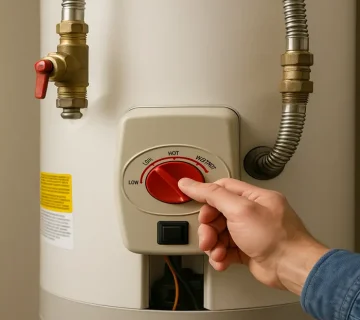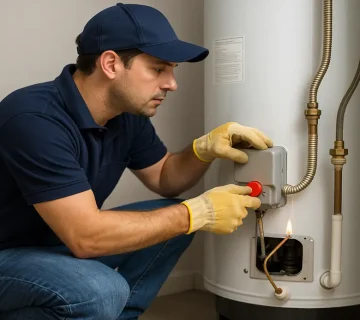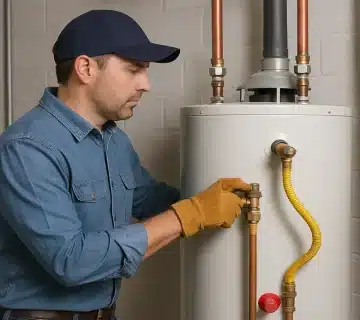When it comes to water heaters, deciding between a tank and tankless model can be a game-changer for your home’s comfort and energy efficiency. Each type has unique advantages, and understanding these differences will help you make the best choice for your household. In this detailed guide, we’ll explore the key insights you need to make an informed decision about Tank vs Tankless water heaters.
1. Understanding Tank Water Heaters
Tank water heaters store a set amount of hot water, which is readily available whenever needed. These units are popular for their simplicity and lower upfront costs. However, they require more space and can run out of hot water during heavy use.
Tank water heaters are suitable for households with consistent water usage patterns and don’t require significant installation modifications. If you prefer a straightforward option, a tank water heater could be the right choice. However, when considering Tank vs Tankless options, think about your space and usage needs.
Tank water heaters are also easier to install compared to tankless models, making them a practical option for those on a budget. However, their energy efficiency may not be as high as tankless systems, leading to potentially higher utility bills over time.
2. Advantages of Tankless Water Heaters
Tankless water heaters provide on-demand hot water by heating it as it flows through the unit. This design eliminates the need for a storage tank and reduces energy consumption by avoiding standby heat loss.
Tankless models are ideal for homes with varying water needs or for those looking to save energy. They last longer than traditional tank units and are compact, making them a great option for smaller spaces. In the Tank vs Tankless debate, these advantages often sway energy-conscious buyers.
Additionally, tankless water heaters are perfect for modern households that prioritize eco-friendliness. By reducing energy consumption, these systems contribute to a greener home, which is an important factor for environmentally conscious homeowners.
3. Energy Efficiency Comparison
One of the most significant differences between tank and tankless water heaters is energy efficiency. Tank models continuously heat water to maintain a set temperature, which can lead to energy waste. In contrast, tankless units heat water only when needed, reducing energy usage.
For those aiming to lower utility bills and reduce their environmental impact, tankless water heaters are often the better choice in the Tank vs Tankless comparison. This efficiency not only saves money but also aligns with sustainable living practices.
4. Installation Costs and Requirements
Tank water heaters generally have lower installation costs since they use existing infrastructure. However, tankless models may require additional upgrades, such as larger gas lines or electrical systems, which can increase installation expenses.
While tankless units have a higher upfront cost, their long-term savings on energy bills can offset this initial investment. Comparing Tank vs Tankless water heaters, upfront costs versus long-term benefits should be a key consideration.
It’s also worth noting that installation complexity for tankless systems might require professional expertise, which can add to the initial costs. However, the efficiency and durability of these units often justify the expense.
5. Hot Water Availability
Tank water heaters store a finite amount of hot water, which can be depleted during peak usage. This can be inconvenient for larger households or during back-to-back showers.
Tankless water heaters provide an endless supply of hot water, making them ideal for families with high water demands. However, the flow rate may be limited if multiple fixtures are used simultaneously. In the Tank vs Tankless debate, this can be a deciding factor based on household size.
For larger families or homes with simultaneous water usage in different areas, installing multiple tankless units can help mitigate flow rate issues. This customization adds to the appeal of tankless systems for modern households.
6. Lifespan and Maintenance
Tank water heaters typically last 8 to 12 years, while tankless units can last 20 years or more with proper maintenance. Regular flushing and inspecting the anode rod are essential for both types to prevent sediment buildup and corrosion.
Although tankless models require more frequent maintenance, their longer lifespan makes them a cost-effective choice over time. This durability is a key advantage in the Tank vs Tankless water heater comparison.
For both systems, scheduling routine professional inspections can help extend their lifespan and ensure optimal performance. This proactive approach minimizes the risk of unexpected breakdowns.
7. Which One Suits Your Home?
Your choice between tank and tankless water heaters depends on your household’s size, water usage patterns, and budget. Tank models are a practical option for smaller budgets and consistent usage, while tankless units are better for energy-conscious homeowners seeking long-term savings and efficiency.
Consulting a professional can help you evaluate your home’s specific needs and recommend the best water heater for your situation. The Tank vs Tankless choice ultimately comes down to your unique preferences.
If you’re unsure, consider factors like space availability, water usage habits, and long-term energy goals. These insights will guide you in making a decision that balances functionality and cost-effectiveness.
Final Thoughts
Choosing between a tank and tankless water heater is a significant decision that impacts your home’s comfort, energy efficiency, and long-term costs. By understanding the key differences and assessing your household’s needs, you can make an informed choice that fits your lifestyle and budget. Whether you opt for a tank or tankless water heater, consider the benefits carefully.
For more guidance on water heaters or to schedule an installation, visit Value Water Heaters. Follow us on Facebook for tips, and check out our YouTube channel for helpful videos.
By weighing the pros and cons of Tank vs Tankless water heaters, you’ll be able to make a confident decision that supports your home’s comfort and efficiency for years to come.





